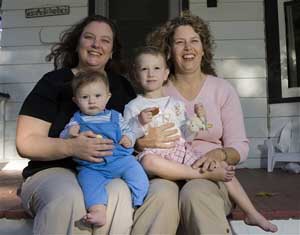-
- In a capital where the disgraced try everything to hang on, Foley exits in a hurry
- Could Wisconsin end 20-state winning streak for same-sex marriage bans?
- Disputed AIDS bill passes House
- Judge rules same-sex R.I. couples can marry in Massachusetts
- Conn. gay rights group backs DeStefano over Rell
- Transgender inmate fakes own death
- National News Briefs
- World News Briefs
national
Could Wisconsin end 20-state winning streak for same-sex marriage bans?
Activists hope support from unions, churches and students will help defeat ban on Nov. 7
Published Thursday, 05-Oct-2006 in issue 980
MILWAUKEE (AP) – When it comes to state votes on same-sex marriage in the United States, the score so far is 20-0 in favor of keeping it a one-man, one-woman institution.
If there is a chance to break the streak on Nov. 7, it might be in Wisconsin, where activists believe support from unions, college students and church leaders – coupled with hoped-for conservative apathy – could enable them to finally overcome the string of losses around the country.
Among the hopeful are Debbie Knepke and Candice Hackbarth, devoted partners for nine years, raising a 3-year-old daughter and 7-month-old son in a pleasant Milwaukee neighborhood. They have joined some 8,000 other volunteers in a bid to defeat a proposed state constitutional amendment that would ban same-sex marriage and civil unions.
“It makes us mad that the Christian conservatives are so against us,” said Knepke, 41. “If they came into our house, they’d find we’re no different from anybody else. We’re every single thing they consider good parents to be.”
Eight states will vote on amendments banning same-sex marriage in November, following 20 that previously approved such measures. Passage is considered certain in Idaho, South Carolina, South Dakota and Tennessee, but gay-rights strategists believe their side is at least competitive in Arizona, Colorado, Virginia and Wisconsin.
Supporters of banning same-sex marriage remain confident of victory, but optimism also is high in the ranks of Fair Wisconsin, a coalition fighting the proposed amendment since it surfaced in the state Legislature in 2004. Large labor unions, many religious leaders, and top Democratic officials – including Gov. Jim Doyle – have spoken out against the measure.
“This could be the state where we beat this thing,” said Fair Wisconsin campaign chief Mike Tate. “I’m not saying it’s easy, but we’ve got the right ingredients on the table.”
Tate believes the same-sex marriage issue – which helped motivate conservative voters in 2004 – is no longer fueling the same urgency, possibly diminishing conservative turnout. One reason is recent court rulings in New York and Washington state against same-sex unions, leaving Massachusetts as the only state allowing same-sex marriage.
The head of the rival campaign, Julaine Appling of Vote Yes for Marriage, said her side may wind up being outspent and out-advertised, but she believes Fair Wisconsin’s confidence is misplaced.
“It’s a gross misunderstanding of the people of Wisconsin,” she said. “They are good solid stock. They understand that marriage is a good public institution – it’s appropriate to protect it as the union of a man and a woman exclusively.”
There have been no major opinion polls since mid-August, when a survey showed Appling’s “Yes” side with 48 percent support, compared to 40 percent against the amendment. Tate says the gap is narrowing as undecided voters tilt against the measure; Appling believes the final result will be in line with Michigan and Ohio, where similar measures prevailed with roughly 60 percent support in 2004.
One of Appling’s allies, Marquette University political scientist Christopher Wolfe, believes the amendment will pass, but perhaps narrowly.
“It’s certainly a lot closer than the people favoring the amendment would like,” said Wolfe, who observed that even at his Roman Catholic school many students oppose the ban.
Tate, at 27 a veteran of numerous campaigns, believes campuses statewide will provide vital support for his side. “This is a motivating issue for young people, whether they’re gay or not,” he said.
While Milwaukee and the state capital, Madison, tend to veer leftward, the rest of the state is generally more conservative. But opinions are deeply divided.
Among those opposing the amendment is Sue Werblow, 60, a longtime school board member in Oshkosh whose three children include a gay son now practicing law in Seattle.
“I would hope and pray people will stand up for nondiscrimination in our constitution, but it’s anybody’s guess,” she said. Her son, observing from afar, “thinks we’re going to lose this battle.”
Kathleen Mentink, a college instructor in Eau Claire who favors the amendment, said most people in her area share her position, “but it’s a quiet support.” Some voters, she suggested, have been wary of revealing pro-amendment views for fear of being depicted as narrow-minded.
Debbie Knepke finds it hard to be dispassionate. Because the children she helps raise, Sienna and Nolan, were borne by Hackbarth, Knepke has no legal standing as a parent and fears passage of the amendment would dim her chances of ever gaining such recognition.
|
|
Copyright © 2003-2025 Uptown Publications


